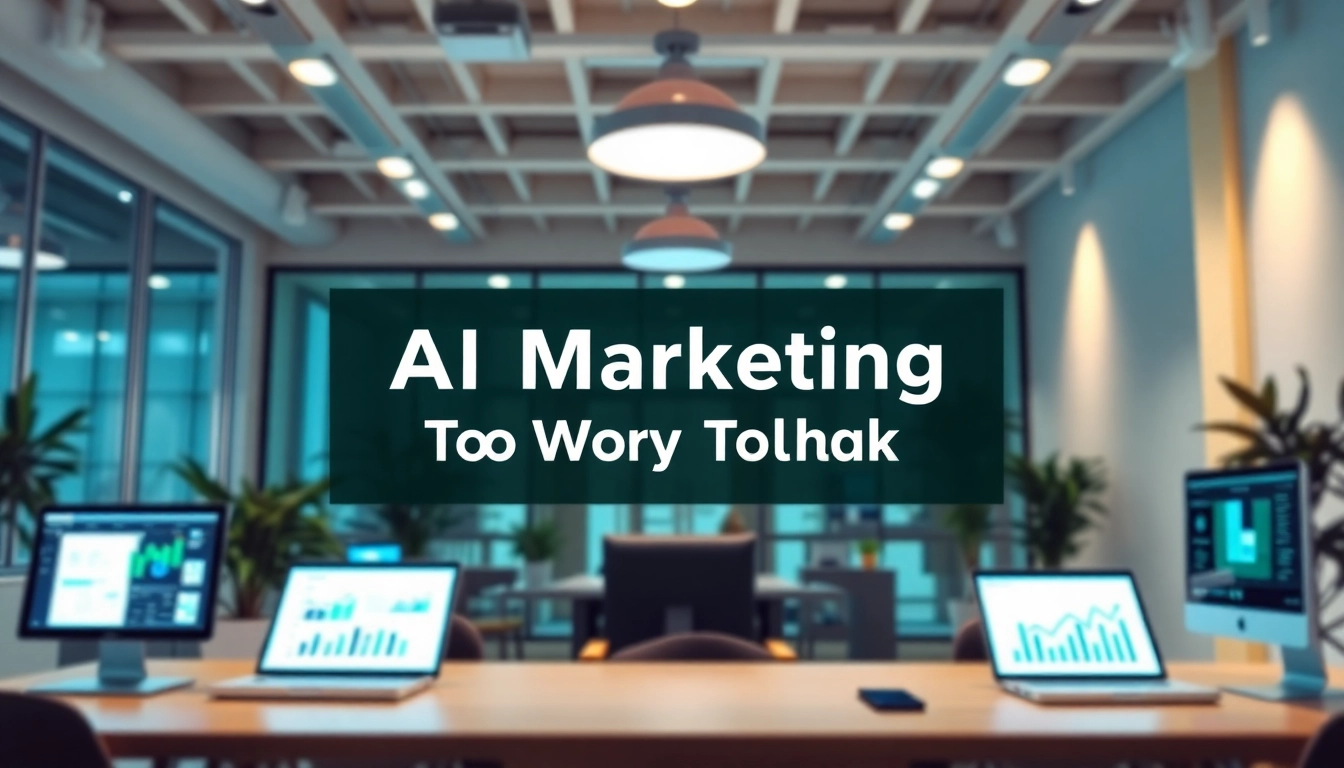Introduction to AI Marketing Tools
AI marketing tools are reshaping the landscape of digital marketing, paving the way for businesses to engage with their customers more efficiently and effectively. As technology continues to evolve, the need for intelligent solutions that can streamline marketing efforts and provide insightful analytics is greater than ever. In this article, we will explore the meaning and significance of AI marketing tools, delve into their primary features, and break down the tools that are making waves in the market leading into 2025.
What Are AI Marketing Tools?
AI marketing tools refer to software applications that utilize artificial intelligence to assist marketers in their campaigns. They can automate repetitive tasks, analyze large data sets, segment audiences, personalize marketing messages, and provide actionable insights. By leveraging machine learning algorithms, these tools can predict consumer behavior, optimize content delivery, and even manage customer interactions, leading to more efficient workflows and improved outcomes for marketing teams.
Why Businesses Need AI Marketing Tools
The digital marketplace is saturating with products and services, making it vital for businesses to stand out. AI marketing tools offer several advantages, including:
- Enhanced Efficiency: Automating mundane tasks such as data entry and reporting allows marketing teams to focus on strategic planning and creative execution.
- Data-Driven Decisions: The ability to analyze vast amounts of consumer data helps businesses to make informed decisions that enhance targeting and improve ROI.
- Personalization: Tailoring marketing efforts to individual preferences can significantly improve customer engagement and loyalty.
- Scalability: As a business grows, AI tools can adapt and scale, ensuring that marketing efforts keep pace with expansion.
Overview of the AI Marketing Landscape
As we approach 2025, the AI marketing landscape is characterized by rapid innovation and increasing adoption. Technologies like chatbots, predictive analytics, and personalized content generation are becoming mainstream. In addition, platforms integrating AI capabilities are emerging, offering holistic marketing solutions that encompass everything from social media management to customer relationship management (CRM). Understanding the landscape enables businesses to remain competitive by staying ahead of trends and technology advancements.
Key Features of Effective AI Marketing Tools
Automation and Efficiency
One of the hallmark features of AI marketing tools is their ability to automate processes. This can range from automating email marketing campaigns to employing chatbots for customer service inquiries. Automation not only saves time but also reduces the likelihood of human error, enabling marketing teams to scale their efforts without increasing overhead costs significantly.
Data Analysis and Insights
AI marketing tools excel at data analysis. They can process vast amounts of information to uncover trends and insights that might otherwise go unnoticed. For instance, AI can analyze customer purchase histories to predict future buying patterns or assess marketing campaign effectiveness by monitoring engagement metrics. Businesses can leverage these insights for more accurate forecasts and targeted marketing strategies.
Personalized Marketing Strategies
Personalization is key to enhancing customer experience and increasing conversion rates. AI tools can segment audiences based on demographics, behavior, and preferences, allowing marketing teams to create tailored campaigns. With personalized messaging and relevant offers, businesses can significantly improve engagement and build lasting customer relationships.
Top AI Marketing Tools Available in 2025
Leading Tools for Content Generation
Content is still king in the digital landscape, and several AI tools specialize in content generation. Tools like Jasper AI provide marketers with capabilities to create high-quality content quickly. From blog posts to social media updates, these tools utilize natural language processing to generate coherent and engaging content pieces.
Another standout is Copy.ai, which helps in crafting marketing copy, ad text, and product descriptions. Its ability to offer creative suggestions can save marketers time and ensure consistency in voice and branding messaging.
Best Choices for Social Media Management
Social media management is a critical area where AI tools can significantly enhance efficiency. Tools like Buffer and Hootsuite employ AI to schedule posts at optimal times, analyze engagement metrics, and provide suggestions for content improvement. These platforms help brands maintain an active and responsive social media presence without the need for constant manual intervention.
Additionally, FeedHive is gaining traction for its content recycling feature, enabling marketers to make the most out of existing content by repackaging it for different audiences.
Powerful Analytics Applications
Advanced analytics tools like Google Analytics and HubSpot use AI to provide insights into website performance, user behavior, and marketing campaign effectiveness. These tools assist in tracking conversion rates, identifying which channels are most effective, and offering actionable insights into customer journeys.
Predictive analytics tools, such as Pendo and Mixpanel, can also be utilized to forecast future customer behavior based on historical data, enabling businesses to strategize proactively.
Implementing AI Marketing Tools in Your Business
Steps for Successful Integration
Successfully integrating AI marketing tools requires careful planning and execution. Here are some key steps:
- Assess Needs: Understand what gaps exist within your current marketing efforts and identify how AI can address these challenges.
- Select Tools: Research and choose tools that align with your specific objectives and workflow. Consider factors like ease of use, scalability, and integrations with existing systems.
- Train Your Team: Ensure that your marketing team is adequately trained in utilizing these tools. Conduct workshops or provide training resources to maximize their effectiveness.
- Monitor and Adjust: After implementation, continually monitor the performance of the tools and make necessary adjustments based on user feedback and performance data.
Monitoring Performance and Results
Establishing metrics to monitor performance is crucial in evaluating the effectiveness of AI marketing tools. Key performance indicators (KPIs) might include engagement rates, conversion rates, and overall ROI from marketing campaigns. Regularly reviewing these metrics enables marketers to understand what works and what areas need enhancement, allowing for data-driven strategies moving forward.
Overcoming Challenges in Adoption
Adopting AI tools may come with challenges, including resistance from team members or misalignment with business goals. To overcome these obstacles:
- Engagement: Involve stakeholders in the decision-making process to ensure buy-in.
- Pilot Programs: Start with pilot programs to test the waters before rolling out tools organization-wide. This can provide insights and build confidence in the new technology.
- Continuous Learning: Encourage a culture of continuous learning where team members are motivated to improve their skills and adapt to new technologies.
The Future of AI in Marketing
Trends to Watch in AI Marketing
As we move further into 2025 and beyond, several trends are emerging in the AI marketing space:
- Enhanced Personalization: The demand for hyper-personalized content will continue to grow, with tools evolving to deliver more tailored messages to individual users.
- Integration of AR/VR: The convergence of AI with augmented and virtual reality will provide immersive experiences that redefine customer engagement.
- Predictive Marketing: AI will become even more proficient in predicting consumer behaviors, allowing businesses to preemptively craft marketing strategies that align with future trends.
Impact on Consumer Engagement
AI’s role in consumer engagement is profound. The capability to analyze real-time data and respond to consumer interactions instantly means that brands can foster deeper relationships with their audience. Companies that leverage AI for customer service, for instance, can provide 24/7 support and address concerns swiftly, leading to increased customer satisfaction and loyalty.
Ethical Considerations in AI Marketing
With the rise of AI-driven marketing, ethical considerations become paramount. Issues surrounding data privacy, the potential for algorithmic bias, and transparency in AI usage are critical. Businesses must ensure that they comply with regulations such as GDPR and prioritize the ethical use of data. Transparency in how data is collected and utilized is essential for maintaining consumer trust.



